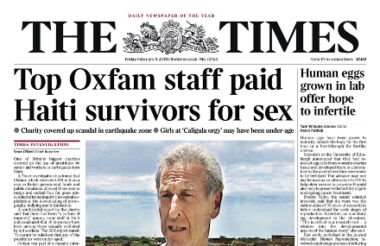Last month I wrote about the collapse of the outsourcing giant Carillion and whether there are any lessons to be learned by charities. Now we find ourselves in a similar situation following damaging allegations of sexual misconduct at Oxfam’s Haiti operations and in its charity shops.
It is worth highlighting the great work that Oxfam does around the world, and none of us would wish to see that harmed by these isolated issues. It should also be said that Oxfam has taken genuine steps to improve its safeguarding function, to the extent that the Dyan Mazurana, an academic specialising in this area, has said that Oxfam is regarded by its peers as now having the best safeguarding policies in place.
However, the charity has clearly made mistakes. To its credit, it has owned up to these, but everyone in the sector needs to analyse them and consider if there are lessons to be learned.
Slow decision making
The first main failing was that it was too slow to expand and develop its safeguarding capabilities. CEO Mark Goldring admitted this on Channel 4 News in response to the frustrations expressed by the former global head of safeguarding Helen Evans. The safeguarding team was still not properly resourced and developed several years after the original Haiti investigation in 2011.
It is hard to pass too much comment on this without having been on the inside and seen how to decision-making process developed. Perhaps it is easy with hindsight to say that more should be done, and it wasn’t so obvious at the time. Perhaps there was a debate about whether resources could be diverted away from frontline aid work in order fund the safeguarding team.
Perhaps it was something else entirely. But it is nevertheless well worth charities considering whether their decision-making is quick, agile and decisive when necessary, and whether they need to be more willing to invest in the necessary support functions to facilitate high quality service delivery.
Transparency
Back in 2011, I faithfully reported on Oxfam’s statement about the internal Haiti inquiry. Reading it back now, it is hard not to feel a little misled.
The statement claimed that Roland Van Hauwermeiren had taken “managerial responsibility” for the issues that occurred while he was head of the programme by stepping down. However, while Van Hauwermeiren denies being involved in any misconduct, the Times' report insinuates that Oxfam's internal investigators believed there was grounds for him to be dismissed, but that allowing him to resign would prevent "potentially serious implications for the programme".
This paved the way for him to go on to be employed at Action Against Hunger.
The statement also claims that none of the charges related to beneficiaries. Oxfam has since explained that at that time, it used the term “beneficiaries” to mean people receiving direct support from Oxfam programmes, whereas now it would talk of beneficiaries more broadly as anyone affected by the earthquake.
International aid charities are now talking about a system of collaboration on safeguarding issues which should help to prevent unsuitable candidates from taking jobs at other agencies.
But the broader point is that Oxfam was economical with the truth in order to protect its reputation, only for its reputation to take a greater hit further down the line.
I am sympathetic to the argument that their legal advice was to not make incriminating public statements about individuals, and that they were advised that taking criminal proceedings was unlikely to lead to a prosecution.
But charities must think long and hard before covering things up in this way. The risk of being sued will be dwarfed by the reputational consequences of being found to have kept things hidden.
References
My last point relates to the employment issues mentioned above, but specifically on the subject of staff references.
There is some confusion about what references were given for whom. Mark Goldring reportedly told BBC Radio 4's Today programme that no official references were given for staff involved, but individual members of staff at Oxfam may have given references informally.
However, communications director Matthew Sherrington later clarified that a minimal and neutral reference was given for one individual.
Either way, there is a lot to ponder in terms of reference policy, not just for charities but for all organisations.
Charity Finance columnist Helen Giles has written in the past about how St Mungo’s asks for at least five years of references and at least two employers to be selected by them from their application form. They ask in-depth questions including indicators of performance against competency requirements.
Any charity that cuts corners on references is putting itself at risk.
But more specifically on the Oxfam case, by not giving detailed, honest references, charities are doing a disservice to other organisations, and by weakening the reference system, increasing the likelihood that they themselves will make a bad appointment.
Some advisors recommend only giving a very basic reference as either the individual or the hiring organisation could sue if you give incorrect information.
However, it should be possible to give honest comments that you are certain are factually accurate without greatly increasing your risk of being sued.
The effectiveness of the reference system depends on it.
Related articles











